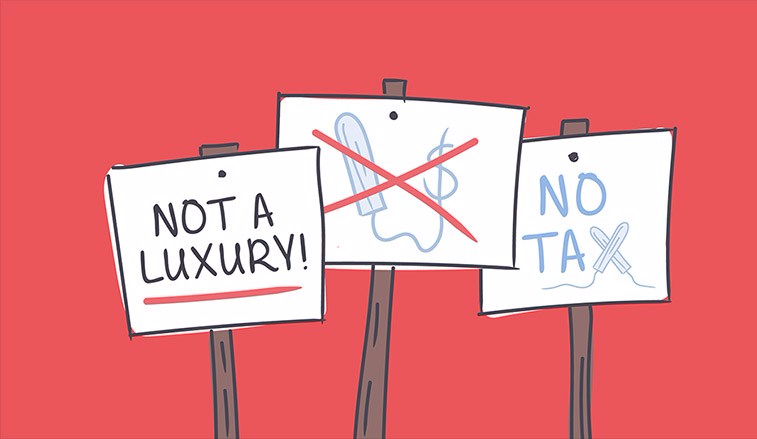
OpEd: Should feminine hygiene products be subject to sales tax?

Bianca Rosen, MA Public Affairs ’17
In 40 states and the District of Columbia, women pay for having their periods. Literally. The sales tax in these states does not exempt feminine hygiene products as a necessity of life. Instead, these products are taxed like other luxury or non-essential items. In California, the sales tax exempts candy and Viagra, while taxing tampons, menstrual sponges, and pads. Women pay an extra price for their biological make up, as menstruation products are deemed by lawmakers as unnecessary to the, “…sustenance of life”. Across these 40 states, the sales tax on feminine hygiene products ranges from 2.9 to 7.5 percent according to the Tax Foundation. In California alone, the taxation of feminine hygiene products generates an estimated $20 million with a 7.5 percent sales tax. The Guide to Local Government Finance in California explains that medicine and groceries are included in the state sales tax exemption. In this instance, medicine is defined as, “any substance or preparation intended for use by external or internal application to the human body in the diagnosis, cure, mitigation, treatment or prevention of disease and which is commonly recognized as a substance or preparation intended for that use”. In other words, menstruation is not considered a medical or health matter, and therefore feminine hygiene products are not a necessity of life.
Of the ten states that do not tax feminine hygiene products, five do not have a statewide sales tax and the other five including Maryland, Massachusetts, Minnesota, New Jersey, and Pennsylvania, have exempted these products from taxation. Across the country, in states like Utah, Michigan, Virginia, Wisconsin and California, there has been a push by activists and lawmakers to exempt feminine hygiene products from the sales tax. Specifically looking at California, the effort for a tax exemption was thwarted in September of 2016 when Governor Jerry Brown vetoed a “No Tax on Tampon Bill” put forth by Representative Cristina Garcia.
According to NPR, some lawmakers argue that, “presenting the issue as an instance of sexism may ignore the nuances and inconsistencies of state tax codes,” citing that an exemption for all women would require a nationwide exemption. Others, like Governor Jerry Brown, worry about the budget implications of such an exemption. When he vetoed the “no tampon tax” bill in 2016, he stated that a combined diaper and tampon tax exemption, “would reduce revenues by about $300 million through 2017-18.” Economist Nicole Kaeding from the Tax Foundation argues that “product-specific” tax exemptions raise the tax rates of other products. Furthermore, it can incite a mad dash by, other interest groups, to get more specific items exempt, creating chaos in state tax codes. If the stability of state tax codes rely on taxing women’s menstruation and preventing our “special interest” in controlling our period, we have a serious problem.
Taxing women for a bodily function that they cannot control is a gendered and discriminatory policy. Such a tax on feminine hygiene products also disproportionately affects low income women and girls. When living from paycheck to paycheck, the $7 to $10 dollars a month for tampons or pads, can really add up. On that same note, what do young girls in these low income families do when they get their period and don’t have access to these products? Most likely, they stay home, as some have told California Assemblywoman Cristina Garcia. This is not only about women’s health and well being, but equal access to to these products for all women.

As discussed in our course, Urban Public Finance, a large part of taxation is encouraging and discouraging certain behaviors. We tax tobacco consumption in order to discourage this behavior as well as to force smokers to pay for the damage this habit costs the healthcare system and the environment. This suggests that as a state, we do not value smoking. We think it does damage that needs to be paid for by those who cause it. In California, Viagra is tax exempt, as an Los Angeles Times editorial puts it, “Viagra is…dispensed to improve quality of life.” Not only do we value men’s erections as a necessity, but we validate its importance with a tax exemption. Feminine hygiene products lack such legitimacy. At the same time that opponents argue feminine hygiene products are not a necessity of life, I cannot imagine they would be okay with menstrual fluids staining the benches of public parks. Menstruation is a part of life for women and taking care of our periods is crucial in sustaining the quality and dignity of our lives. Until lawmakers and opponents of a “no tampon tax” have a period and walk around for a day without a tampon, they have no right to make women pay for having theirs.
Activists, organizers, and lawmakers in every state should continue advocating for a “no tampon tax.” Menstruation is also not a disease, as the tax code includes as a stipulation in the definition of medicine. We need to revisit how language in the tax code can be altered to better reflect the realities of women’s every day lives. The change we need on an even larger scale is more women in elected office. When President Obama was asked why he thinks there is no exemption for feminine hygiene products, he answered, “I suspect it’s because men were making the laws.” With more women in office, their understanding of what is and is not necessary in sustaining women’s lives can help to create policies that reflect those necessities.
